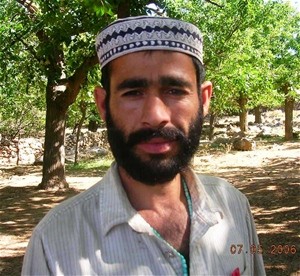
Mr. Mohammad Noor recently returned from Badakhshan Province where he worked in the poppy fields.
USAID/ALP/E
The Alternative Livelihoods Program (ALP/E) provides licit economic opportunities to the people in the eastern region
ALP/E cash-for-work projects have provided employment opportunities for 17,535 people, generating 856,521 working days and paying $3,377,230 in wages.
15 JULY 2006 | ZAWA, KHOGYANI DISTRICT, BADAKHSHAN PROVINCE
“I worked on poppy fields in Badakhshan and could hardly earn Afs. 5,000 per month ($100) including my stay and food. When I got to know that ALP/E cash-for-work projects started in our village close to my home with good pay, I decided to come back to the region and work in the cash-for-work project,” said Mohammad Noor, a 28-year old who supports a joint family of seventeen members in Zawa, Khogyani District of eastern Afghanistan.
When the government of Afghanistan imposed restrictions on growing poppy, many farmers left their families in the eastern region to travel to remote parts of the country where they could earn money planting and harvesting illegal poppy.
Itinerant laborers like Mohammad Noor, who became aware of ALP/E’s cash-for-work projects are returning home for opportunities to make legal wages and feed their families.
“I worked here for three months and earned enough money legally that I couldn’t earn in other parts of the country through the poppy fields. I got more than Afs. 4,000 a month ($80),” said Noor. Noor’s wages for legal work near his home are roughly approximate to his wages harvesting poppy.
The long term outlook is bright as agricultural and economic growth programs are beginning to revitalize the local economy. In the meantime, more immediate labor-intensive projects, like flood-wall protection and cobblestone road building—a technique ALP/E replicated from a previous DAI program in Bolivia—are providing an inducement to men like Noor who want to return to jobs with comparable pay under ALP/E’s cash-for-work program.
From June 1, 2005 to July 15, 2006 the cash-for-work program has employed more than 17,500 individual workers whose efforts have resulted in more than 2,425km of irrigation and drainage canals, 329km of rural roads and over 170,182 hectares of irrigated fields.







Comment
Make a general inquiry or suggest an improvement.